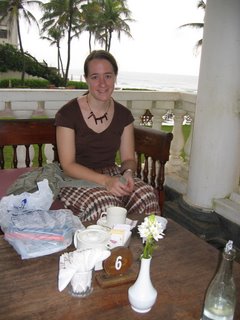NGO neo-imperialism
I have never been good with acronyms. This character flaw is turning out to be a bit of a blight on my current personal and professional encounters here. In NGO-i-stan everything has an acronym. I thought I was doing good knowing UNHCR, WFP, ILO, ICRC, etc. But here I’ve had to learn who is OCHA, IOM, ZOA, etc. And these letters are the point of reference for almost everything: Directions: ‘It’s on the street parellel to UNICEF’; Personalities: ‘Oh that’s Bob from IOM’. And these are just INGOs –you also have to learn CBOs…SLPI, CPA, …arrrrgh. Then there’s the lingo. You prepare your MoA or your strategic paper or your concept paper. You have to have an M&E plan and maintain your ‘burn rate’.
I am trying to learn this new language.
Even if I master these trappings of NGO life, I don’t know that I ever will come to terms with the dominant NGO culture—nor do I think I want to.
The ‘work’ of NGO’s sometimes seems to have more to do with the ideas of donor agencies than of actual local needs. Timetables are likely to be set to please donors rather than to pursue the best quality outcomes. Projects are often determined based on what donors want to fund rather than starting with what local people are asking for. As far as media, donor agencies ‘help’ local media by commissioning coverage of their projects. Many don’t seem to get the concept of editorial firewalls, or the division between PR and journalism.
I went to my first INGO-GA (!) meeting recently. It’s where all the international NGOs in the area meet with the ‘Government Agent’ who runs the district government. Here’s a not atypical line of acronym-dense prose from their minutes of a previous meeting: “NRC sought help from the GA on assisting IDP from Muthur who do not have their NIC.”
I sheepishly took a seat in the ubiquitous plastic chairs lining the wall. The room was mostly taken up by three large rectangular tables arranged in a U facing the GA’s desk. Representatives of alphabet soup agencies sat around the tables. Most seemed to be in their 20s and 30s. Their NGO uniforms consisted mostly of jeans or slacks and t-shirts. It reminded me of model-UN except people were less dressed up. Granted these are people who in theory at least are working in the field overseeing various construction projects—rebuilding tsunami destroyed houses or bridges or sanitation systems. Still it smacked of Western arrogance to witness these decidedly casual young people who could effectively dictate the terms of aid money to aging ‘natives’. I have always hated dress codes and having to dress ‘professionally’ but even I felt moved to stretch myself to business casual to show a little respect. Not as a nod to corporate culture, but as a nod to Sri Lankan professional norms.
Don’t get me wrong. Most of the NGO folks I’ve met have been quite agreeable people who are doing great work. And they’re motivated by high ideals and intentions. But I kept wondering where this road they are paving is leading.
My impressions I admit have been decidedly colored by discussions I’ve had with Sri Lankans who’ve bemoaned how the post-tsunami NGO invasion has torn apart elements of the local cultural fabric. They complain in past times, communities faced with hardship or tragedy would band together to help each other. They say the massive influx of tsunami money changed that. There was money to be made in helping one’s neighbor. One person spoke of a case where a man asked a neighbor to borrow a piece of equipment to do some repairs, and the neighbor asked for money in return. She said that would have never happened before. She said Sri Lanka would have been better off without the ‘help’ of NGOs.
Of course the NGO influence predated the tsunami, but the tsunami changed the scale. Now in many communities NGOs are some of the biggest employers. Local people with good English master NGO speak with fervor. People who know just a few words of English become the NGO drivers and security guards and makers of tea. With the war destroying many local economic prospects, including tourism, this is understandable. But it’s now assumed that anyone who is not local works for an NGO.
I can’t help but cringe when I get called Madam. Yes, Madam. Madam would you like some tea. Ok Madam. All us NGO people are Sir or Madam. I feel like a colonizer, complicit in something that is not as it should be.















